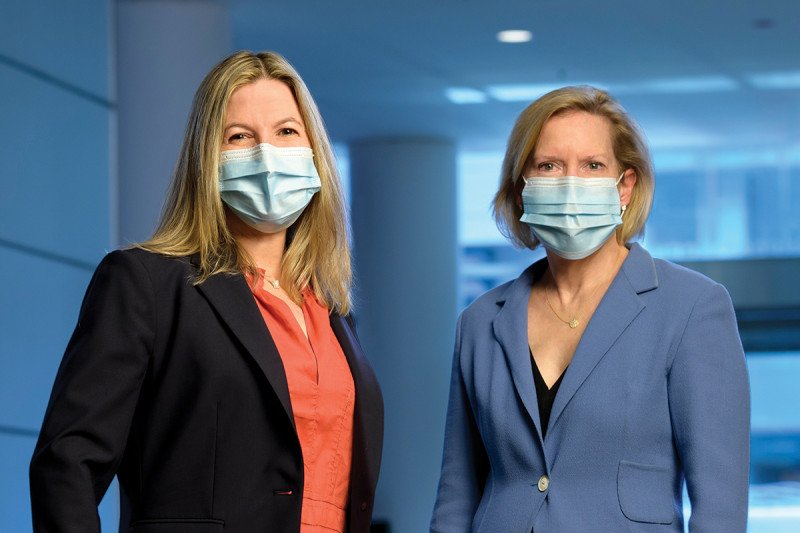
Eliza Weber (left) and Kate Niehaus say that patients have always taken the lead on the Council’s efforts to improve care.
In 2014, Kate Niehaus, a former patient active in volunteer work for Memorial Sloan Kettering, was approached by Kent Sepkowitz, an infectious disease specialist and Deputy Physician-in-Chief for Quality and Safety, with a proposal to make MSK’s outstanding cancer care even better.
“The idea was to bring patients and families into the center of everything that goes on at the hospital,” she says. “Kent was a physician on the front lines during the AIDS crisis and had seen the power that patients can have in driving change.” Over the next year, Ms. Niehaus worked with two MSK staff members to form the Patient and Family Advisory Council for Quality (PFACQ).
Now celebrating its five-year anniversary, PFACQ has become a partnership of current and former patients, family members, caregivers, and MSK staff that ensures the patient and family perspective is included in everything MSK does. The guiding principle of their work is that patients and caregivers who have gone through the cancer journey are able to provide insights that nobody else can.
Would you like to become a patient or family advisor? PFACQ is seeking new members to share their voices and experiences to help improve the quality of care at MSK. For more information or questions, please contact us at pfacq@mskcc.org.
“With PFACQ, we say ‘our experience is our expertise,’” says Eliza Weber, PFACQ’s current co-chair. “If you were a cancer patient or caregiver, you know better than anyone what it feels like to pass through the different stages of treatment and how the experience might be improved.”
“From the start, Kent’s approach was, ‘You — patients and family members — are really the ones driving this,” Ms. Niehaus recalls.
In its first year, PFACQ identified three pivotal points of care that patients found especially difficult — diagnosis, transitioning from active care to survivorship, and end of life — and then began implementing countless changes to address these concerns. For example, PFACQ helped set up clear, organized information on MSK’s online patient portal to explain what documents and medical information are needed for a first appointment — easing the burden for often-overwhelmed, newly diagnosed patients.
Moreover, they encouraged hundreds of MSK doctors, nurses, staff, and patients to come together around the dinner table (now virtual tables) to talk with each other about end-of-life preparedness in a monthly event called “Death Over Dinner.”
“It’s an example of recognizing that we weren’t addressing a critical part of patient care and saying, ‘We have to be better at this,’” says medical oncologist Diane Reidy-Lagunes, who has been a PFACQ member throughout most of its five years.
More recently, PFACQ members spoke to hospital leadership about the anxiety of awaiting results from imaging scans, the variability of the waiting period, and its impact on the patient’s emotional well-being. In response, MSK began ensuring all imaging results were available on the portal within two business days after being read by a radiologist. In addition, PFACQ was an instrumental partner in the development of a “patient values tab,” a new process by which nurses ask patients at the beginning of their care to talk about their needs and goals. That information is added to the patient’s emergency medical record and can help guide treatment decisions.
PFACQ’s 32 volunteer members continue the important work of finding ways to improve how care and support is given at MSK, serving on more than 25 committees relating to hospital quality and patient care.
“Having a seat at the table makes a huge difference,” Ms. Weber says. “We encourage anyone who has received care at MSK, whether as a patient or caregiver, to apply to join our group and see how rewarding it is to make the experience better for the next person.”

